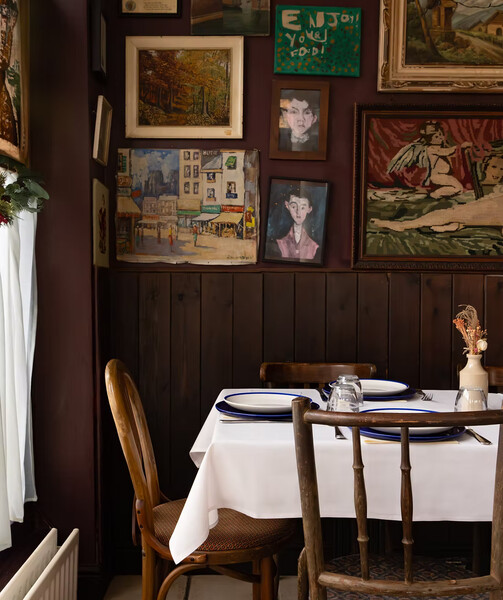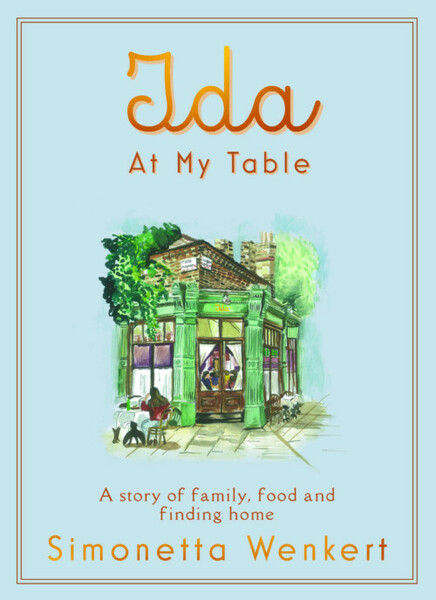An unlikely combination of novelist and restaurateur, Simonetta Wenkert turned her pen to recording the story of Ida, from its roots in Italy's Marche region, to flinging open the doors in 2007 and the many highs and lows that followed over nearly two decades in business. It's a beautifully told story and here, in the opening extract, is a glimpse of the spirit of family and generosity and that run deep in the DNA of London's Best Local Restaurant.
I watched as Ida tipped the contents of the bag onto the kitchen table, patting and sweeping the mound of lentils outwards with the blade of her palm towards the edges of the patterned oilcloth.
'That's how you see if there are any stones in them,' Ida explained, and I blushed, wondering whether she was judging me for not knowing.
Seven months pregnant, I'd flown to Rome in the middle of an almost biblical heatwave to give birth to my first child. Avi and I had been living in Jerusalem, and the plan was that I would go ahead to find a hospital in Italy, and he would join me in time for the birth. His mother, Ida, and I hardly knew each other at this point, and a part of me wondered how we were going to get along for the next two months without Avi acting as glue.
Lentils were a winter dish, eaten all over Italy on New Year as an augur of good fortune due to their resemblance to tiny coins, so it seemed strange that we should be preparing them in August. Besides it was too hot to eat; my ribcage ached, and I was finding it increasingly hard to breathe as the baby grew and pressed against my lungs.
Perhaps Ida thought lentils would be nourishing for her grandchild, or else she had a craving for them herself. Later, as I got to know her better, I would discover that years of living alone with nobody to think of but herself meant she would indulge the desire for a dish she hadn't eaten since childhood, or a sudden compulsion to clean the slats of the venetian blinds in the bathroom at 6am, or fresh bed sheets every day, simply because she enjoyed the sensi ousness of ironed cotton against her skin.
That first morning, I remember Ida and I walked to the covered market in via Catania, extra early, in order to avoid the heat, and returned with a waxed paper bag of Castelluccio di Norcia lentils, which are grown on a plateau on the Sibylline mountains in Umbria. To this day, I can picture Ida's hands, small, plump and almost unlined, with little fingers that curved inwards so that they resembled scoops; the 'hnnnn' of satisfaction that escaped her when the last lentil had been swept back into the bag.
We sat for a while in silence, listening to the sounds of the courtyard floating in through the kitchen window, pots banging in sinks, the screech of washing lines being pulled in, the thump of plates on tablecloths. I felt the baby flip and turn, and wondered if this was going to be my life now. Shopping and cooking, mornings spent sifting through lentils.
Then, Ida reached into the pocket of her housecoat. 'Take this,' she said, pressing a plain gold band into my hand. 'For the hospital.'
'Why?' I stammered.
‘This is Italy. Doctors won't respect you if they know you're unmarried.'

I slid the ring on to my finger, but I didn't care for how it looked. I had surrendered to the pregnancy with wonder and joy, but there had been losses, too, an indefinable sense that my life as a writer might be over. Instinct told me I needed to hang on to something of my old self before the lines got too blurred. Besides, the Sardinian midwife at the hospital, Rosetta Madau, turned out to be an unmarried mother herself.
‘You're not to worry about a thing, cocca,' she said, squeezing my hand, when I told her that my partner would be flying in before my due date.
As she pressed the transducer wand over the hillock of my belly, I caught a flicker of pity in her eyes. She doesn't believe me. In her mind, I was a poor, delusional inglesina, condemned to giving birth alone and in secret, as it turned out she herself had when she had arrived in Rome as a young girl off the ferry from Cagliari.
From that moment onwards, Rosetta Madau would telephone the flat in piazza Bologna every few days to ask how I was getting on, or to tell me that the ultrasound machines were free if I wanted to drop by the hospital for a quick scan, or that the phlebotomist would stay on an extra hour at the lab to check my glucose levels. And when Avi did indeed return to Rome for the birth, Rosetta Madau greeted him like a prodigal son.
That summer, I felt as though Ida and I were characters in a Márquez novel as we sat for hours in the darkened sitting room of the flat in piazza Bologna, talking and fanning ourselves with paper fans from the Chinese stall in the market, the wooden shutters, and even the windowpanes, sealed shut against the heat. I probably learned more about my future mother-in-law, and she about me, than if we'd got acquainted in more conventional circumstances. Perhaps, too, the perpetual dusk of that flat in piazza Bologna, the hours and days running into each other as we waited for Avi to return and for the baby to be born, favoured confidences that otherwise might not have been proffered. Who knows? But I no longer felt judged by Ida, and I started to grow fond of her – and she, I hope, of me.
Ida told me about her childhood in Cupramontana, how she left home at sixteen to work at a hospital in an Adriatic coastal town called Porto Potenza, where once or twice a week she would get up before dawn to accompany the fishermen out to sea so they would give her some of their precious catch. How she fell in love with the hospital heartthrob, an émigré Jewish doctor called Bernardo Reichenbach, who was later captured by the Nazis and imprisoned in a Polish concentration camp, but who, after the war, would return to Italy and become her husband.
I'm glad we had that time together, because on 21 November 1994, two months to the day that our daughter, Isotta, was born in Rome's San Camillo Hospital, Ida Zanni died. While I had been growing a life, it turned out hers had been ebbing away. Clara, Avi's sister, told me her mother had known that she was sick, though no amount of pleading would convince her to see a specialist.
‘Ci siamo conosciute poco, Isottina,’ – we didn't know each other long, Ida murmured, as she asked us to lay the baby down beside her on the pillow, and they looked into each other's dark eyes. Our daughter is a young woman now, who has her grandmother's hands, as well as those eyes.

This extract is taken from Ida at my table by Simonetta Wenkert, published by Bedford Square Publishers. Buy the book at idarestaurant.co.uk






